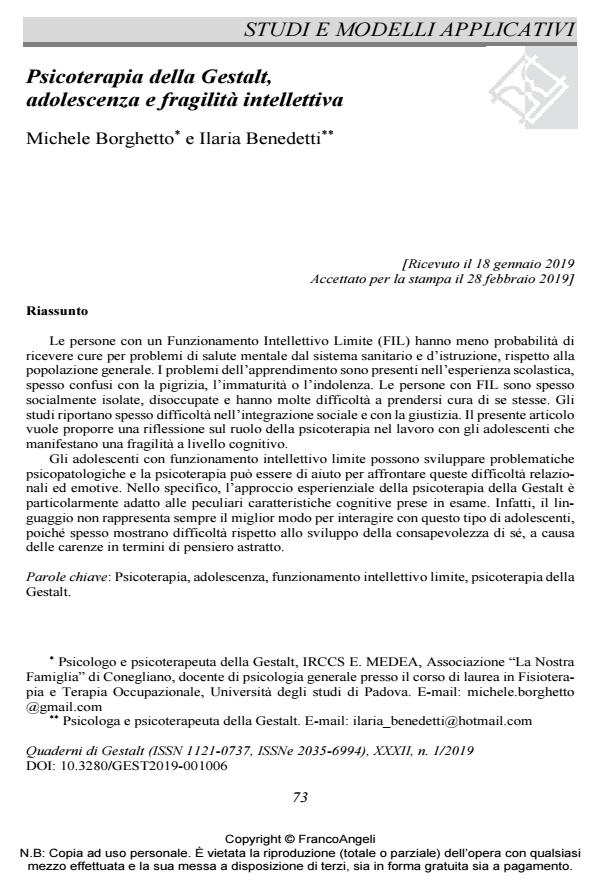Gestalt Psychotherapy, Adolescence and Intellectual Weakness
Journal title QUADERNI DI GESTALT
Author/s Michele Borghetto, Ilaria Benedetti
Publishing Year 2019 Issue 2019/1
Language Italian Pages 15 P. 73-87 File size 213 KB
DOI 10.3280/GEST2019-001005
DOI is like a bar code for intellectual property: to have more infomation
click here
Below, you can see the article first page
If you want to buy this article in PDF format, you can do it, following the instructions to buy download credits

FrancoAngeli is member of Publishers International Linking Association, Inc (PILA), a not-for-profit association which run the CrossRef service enabling links to and from online scholarly content.
People with borderline intellectual functioning (BIF) have an IQ test score that is 1 to 2 standard deviations below average, in a range between 71 to 84. BIF in DSM-5 is not consid-ered a disorder, but is a V-code diagnosis. These people often experience academic problems from their early school experiences. These are frequently confused with laziness, immaturity or listlessness. Individuals with BIF are proportionally less likely to receive treatment for men-tal health problems than the general population. In Italy, for example, they do not have the possibility to receive the same assistance in school as people with intellectual developmental disability. In other countries, they do not have the possibility of being included in special clas-ses. This therefore becomes a problem in relationship to children or adolescents with normal capabilities. People with BIF are often socially isolated, unemployed and have many difficul-ties taking care of themselves. Research studies report difficulties in social integration and with criminal law. Gestalt Therapy considers this disorder to be lack of full contact which increases suffering in the relationship. The therapist decides to stay at this boundary of contact with the patient in order to stimulate new creative adjusting and a new solution in the here and now. But is it pos-sible toaccomplish this with people impaired in comprehension and intellectual competence? The principal purpose of this article is to analyze the role of psychoterapy with adolescents who are characterized by cognitive dedficiencies. Often clinical work is focused on intellectual abilities deficiency and the emotional issue’s importance is underestimated. Adolescents with borderline intellectual functioning instead can develop problems in psychopathological sense and psychoterapy can help them through their relational and emotional difficulties. In particu-lar, the experiential approach of GT is extremely suitable for the particular cognitive features of these boys and girls. In fact, language rarely represent the best way to interact with these ado-lescents, who often have difficulties in improving their awareness because of gaps in abstracts thoughts.
Keywords: Psychotherapy, adolescence, borderline intellectual functioning, Gestalt therapy.
Michele Borghetto, Ilaria Benedetti, Psicoterapia della Gestalt, adolescenza e fragilità intellettiva in "QUADERNI DI GESTALT" 1/2019, pp 73-87, DOI: 10.3280/GEST2019-001005